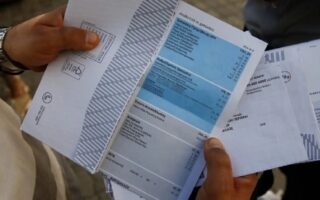Forging a Balkan front on electricity rates

Greece is launching an initiative to form a common front with the Balkan countries of the European Union on electricity rates, as their dramatic rise, which was first observed in Southeastern Europe in July, is not temporary but is taking on more permanent features and its effects cannot be tackled by government subsidies.
Western European countries seem to have shifted the burden of giving power to Ukraine (whose production and infrastructure have been hit by Russian incursions) to Greece and the other countries in Southeastern Europe. “It is not possible for Austria to have a price at 154 euros and the neighboring interconnected market of Hungary at €238. Something is wrong and the EU should see this and intervene,” a competent government official tells Kathimerini, revealing that the government is taking action to form a “Balkan front,” with the governments of Bulgaria and Romania. They will demand either the strengthening of energy flows from Western Europe to Ukraine, or the financing of the Balkan countries to support affected businesses and consumers.
Besides the self-evident large price discrepancies, Athens, Sofia and Bucharest will base their demand to the EU on the findings of the competent national independent authorities investigating whether the limited flows from Western Europe to Ukraine are indeed due to the capacity of interconnections, as well as how the algorithms that regulate energy flows from the cheapest to the most expensive markets work.
This front comprising Greece, Romania and Bulgaria comes in continuation of a front of the three countries’ industries established in July with the first wave of price jumps. In a joint letter to the EU’s Directorate-General for Energy and the Directorate-General for Competition, the Associations of Industrial Consumers of Greece, Romania and Bulgaria raised the issue of the huge price discrepancies in the markets of Southeast Europe with the rest of the European markets and the unfair competition they cause to their detriment.
The letter was sent on July 17 and following the EU’s reply letter received on August 2 that the matter has been referred for investigation to the Agency for the Cooperation of European Regulators (ACER), the three industry associations sent a second letter of protest on August 29.





